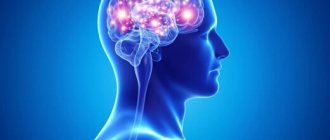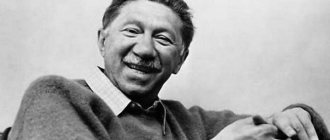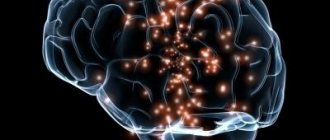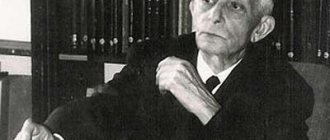Greetings, dear readers!
Psychology (from the Greek words “psyche” (soul, character) and “logos” (science) is a science that studies the human psyche , patterns in the behavior of individuals and their groups, as well as the features of their interaction with each other. Psychology studies all mental processes - both conscious and unconscious by a person.The main goal of this science is the accumulation of knowledge that is of practical value for various spheres of life and professional activity.
Psychology is a relatively young science, which appeared in 1879. But the “Doctrine of the Soul,” which served as its prototype, existed in ancient times. For many centuries, human mental processes have been studied at the intersection of biology, medicine, philosophy, pedagogy and other sciences. And only at the end of the 19th century a modern understanding of what psychology was formed, and it became a completely independent science. Its creator is considered to be the German doctor Wilhelm Wundt.
What does psychology study?
The main object of study of this science is human mental processes - feelings, emotions, goals, motivation, imagination, thinking, decision-making, temperament and other features of behavior and perception. Psychology tries to answer the question of what motivates a person in various situations , why he makes certain decisions, what processes occur in his “inner world.”
The tasks of modern psychology include studying and solving problems in various spheres of human life - both personal and professional. Within this science there are a large number of separate applied areas that study individual aspects of human activity. Simple examples include the following areas:
- age-related psychology;
- social Psychology;
- family psychology;
- psychology of sports;
- psychology of religion.
The tasks of each direction are obvious from the name. Thus, developmental psychology studies the characteristics of human behavior at different stages of life. The object of study of social psychology is the interaction of people in society and the characteristics of their behavior dictated by this interaction. Family psychology deals with strengthening the family and resolving intra-family contradictions. There are areas that study human behavior in sports, religion, industrial production, education and other areas.
/ Home / Textbooks / General psychology / Subject, tasks of psychology
Chapter 1. Psychology as a science.
1.1 Subject and tasks of psychology.
1.1.1 Psychology is the science of the psyche
Literally translated, psychology is the science of the soul (psyche - soul, logos - concept, teaching), thus psychology is the science of the psyche and mental phenomena.
What is the psyche? Materialist scientists define it as a special form of reflection of the surrounding world, characteristic of highly organized matter.[1] It should be noted here that the psyche arises where there is a rather complexly organized nervous system, which means that mental phenomena are characteristic not only of humans, but also of animals. Moreover, science does not exclude the possibility that, over time, quite complex computer systems may be artificially created in which psychic phenomena may arise.
The peculiarity of psychology that determines its difficulties is the non-materiality of mental phenomena, as a result of which they are not accessible to direct study.
The psyche cannot be seen, heard, tasted or touched.
Neither a super-powerful microscope nor the most sensitive methods of chemical analysis will help in studying it. We can study the psyche only indirectly, drawing certain conclusions about mental phenomena only from the external, material signs of their manifestations. This is the complexity of psychology as a science, but this is what makes it fascinating.
Psychology is the science of the psyche and mental phenomena.
The psyche is a special form of reflection of the surrounding world, characteristic of highly organized matter (humans and animals). For a person who has the highest form of psyche - consciousness, another definition of psyche is given:
The human psyche is a subjective image of the objective world, which arises in the process of interaction of a person with his environment and other people.
1.1.2 Features of psychology as a science
1.1.3 Main directions of psychology
Freudianism and neo-Freudianism are the predominant role of the subconscious in human mental life.
Behaviorism – behavior as the main object of research and rejection of attempts to study the mechanisms of mental activity.
Gestalt psychology is an attempt to explain the phenomena of mental life based on the concept of a holistic image (gestalt), irreducible to the sum of individual elements of perception.
Humanistic psychology - perceives a person as an active, free, creative and autonomous subject with a desire for self-realization.
1.1.4 Subject of psychology
The subject of psychology changed during its formation as a separate science. At first, the subject of its study was the soul, then consciousness, then human behavior and his unconscious, etc., depending on the general approaches that psychologists adhered to at certain stages of the development of science.
Currently, there are two views on the subject of psychology. According to the first of them, the subject of study of psychology is mental processes, mental states and mental properties of the individual. According to the second, the subject of this science is the facts of mental life, psychological laws and mechanisms of mental activity.
Let's consider the first approach to the subject of psychology (Fig. 1.3):
Mental processes act as primary regulators of behavior; they have a beginning, course and end. Usually there are three types of them: cognitive, emotional and volitional.
In addition to the above, there is another classification of mental processes. According to it, mental processes are divided into individual and group, and then into internal and external (Fig. 1.4).
On the basis of mental processes, mental states can be formed that characterize the state of the psyche as a whole. These include, for example, a state of activity or passivity, vigor or depression, efficiency or fatigue, irritability, absent-mindedness, good or bad mood. Mental states influence the course of mental processes. They can be external and internal, individual and group.
For example, a group mental state such as panic is the cause of financial crises, defaults and bank failures. Another negative mental state is conflict, which can lead to the breakdown of business negotiations or the destruction of family relationships. Both of these states are intermediate in nature, since, on the one hand, they are an internal mental experience, and on the other hand, they have a pronounced external manifestation.
In addition to negative group psychological states, there are also positive ones, for example, the cohesion of the enterprise team or a favorable psychological climate within the organization.
The third group of mental phenomena are mental properties that are characterized by greater stability and constancy. They determine the uniqueness of a person and are the basis of his personality. When we call a person brave, hot-tempered, honest or gambling, then with these words we describe precisely the stable personality traits.
Some authors believe that within the framework of this classification, one more type of mental phenomena can be additionally distinguished: mental formations - what becomes the result of the development of the human psyche. Mental formations are formed in the process of a person acquiring life and professional experience. These include knowledge, skills, abilities, habits, attitudes, attitudes, beliefs, etc.
According to another approach to defining the subject of psychology, it is the facts of mental life, psychological laws and mechanisms of mental activity
The facts of mental life include the speed of the sensorimotor reaction, some processes of sensation and perception of reality (for example, optical illusions), facts of psychological defense of established beliefs, emotional reactions that arise when new information arrives, etc.
An example of a mental law is the Weber-Fechner law concerning relative thresholds of sensations: “the intensity of sensation is proportional to the logarithm of the strength of stimulation.”
Another example: the law of changes in the rate of development of a motor skill. The figure below shows the exponential nature of the change in the rate of development of a motor skill - the speed of working on the keyboard. At first the result grows very quickly, and then slows down
The mechanisms of mental phenomena are the most difficult to identify and study. To date, they have been little studied, but the progress of psychology is associated precisely with this direction. An example is the occurrence of a feeling of pleasure when the electrical activity of certain centers of the hypothalamus in the diencephalon increases.
1.1.5 Object and tasks of psychology
The main task of psychology as a science is to study the objective laws of the formation, development and manifestation of mental phenomena and processes.
Particular tasks of psychology are:
1) study of the mechanisms of mental phenomena and processes;
2) analysis of the patterns of development of mental phenomena and processes in the process of ontogenesis, social interaction of people and work activity;
3) to promote the introduction of knowledge of psychological science into the practice of people’s lives and activities.
As for the object of psychology , we encounter certain difficulties in defining it. It is usually believed that the objects of science are the carriers of the phenomena and processes that this science studies. Thus, the object of psychology must be recognized as a person. However, according to the ethical standards of Russian methodology, a person cannot be an object, since he is a subject of knowledge. To get out of this terminological contradiction, we can designate the object of general psychology as a process of interaction between a person and the surrounding world.
1.1.6 Cultural-historical paradigm
The cultural-historical paradigm (theory) was developed by the Soviet psychologist L.S. Vygotsky, and was further developed in the works of A.N. Leontyev. It was based on the ideas of the French sociological school: the idea of historicism and the social conditioning of the psyche. Before this, there was a natural science paradigm in psychology, the differences between which and the cultural-historical paradigm are shown in Fig. 1.9:
According to the views of L.S. Vygotsky and A.N. Leontiev, the social environment acts as a source of development of the child’s higher mental functions. Attitudes toward the environment change with age, and therefore the role of the environment in development also changes. The development of a child is subject to the action of socio-historical laws.
The driving force of mental development is learning (and development and learning are different processes). Education is an internally necessary moment in the process of development in a child of properties historically inherent in man. Learning is not identical to development: it creates a zone of proximal development, i.e. awakens and sets in motion the child’s internal developmental processes, which at first are possible for the child only in the sphere of relationships with adults and cooperation with peers.
1.1.7 Psychology as a science and as a system of everyday knowledge:
Please note that by the word “psychology” people understand not only science, but also a certain system of everyday knowledge. There are both similarities and differences between these areas of human culture. The similarity is that both of these areas study the same thing - the human psyche, but the differences between them are very significant (Table 1.2).
Nevertheless, there is a certain correspondence between everyday and scientific knowledge. Often everyday knowledge is manifested in folk proverbs and sayings.
1.2 Structure of psychology.
The modern structure of psychological science consists of a number of relatively independent scientific disciplines or branches: General psychology, Psychophysiology, Developmental psychology, Educational psychology, Medical psychology, Social psychology, Psychodiagnostics, Psychotherapy, etc.
There are also branches of psychology associated with certain areas of human activity: military psychology, sports psychology, engineering psychology, legal psychology, space psychology, etc.
1.3 Relationship between psychology and other sciences.
Philosophy. The greatest philosopher of antiquity, Aristotle, is considered the founder of psychology. Philosophy is a system of views on the world and man, and psychology is the study of man. Therefore, until recently, psychology was studied in philosophy departments of universities, and some of its sections (for example, general psychology, where definitions of the basic concepts of science are given) are closely intertwined with philosophy. However, psychology cannot be the “handmaiden of philosophy,” as was the case in the Soviet Union, where Marxist-Leninist philosophy strictly defined the basic postulates of psychology. These are two independent sciences that can mutually enrich and complement each other. At the intersection of philosophy and psychology there is such a branch of the latter as “General Psychology”.
Natural science is closely related to psychology. The development of theoretical and practical psychology in recent years would have been impossible without advances in biology, anatomy, physiology, biochemistry and medicine. Thanks to these sciences, psychologists better understand the structure and functioning of the human brain, which is the material basis of the psyche. “Psychophysiology” is located at the intersection of physiology and psychology.
Sociology as an independent science is closely related to social psychology, which is the bridge that connects the thoughts, feelings and attitudes of individuals with the phenomena of mass consciousness. In addition, sociology provides psychology with facts about the social activities of people, which are then used by psychology. The connection between psychology and sociology is provided by “Social Psychology”.
Technical sciences are also related to psychology, since they often have the problem of “docking” complex technical systems and humans. These issues are dealt with by “Engineering Psychology” and “Occupational Psychology”.
Story. Modern man is a product of historical development, during which the interaction of biological and mental factors took place - from the biological process of natural selection to the mental processes of speech, thinking and work. Historical psychology studies changes in the psyche of people in the process of historical development and the role of the psychological qualities of historical figures on the course of history.
Medicine helps psychology better understand the possible mechanisms of mental disorders in people and find ways to treat it (psychocorrection and psychotherapy). At the intersection of medicine and psychology there are such branches of psychology as “Medical Psychology” and “Psychotherapy”.
Pedagogy provides psychology with information about the main directions and patterns of training and education of people, which makes it possible to develop recommendations for the psychological support of these processes. The connection between these related sciences is provided by “Educational Psychology” and “Developmental Psychology”.
Rice. 1.10 Relationship between psychology and other sciences.
1.4 Development of ideas about the nature of psychological phenomena.
People have always been interested in the external world (“macrocosm”), but in order to achieve their goals in it, a person needed to understand the behavior of other people and himself. Therefore, people have long tried to study the inner world of man (“microcosm”).
Stage 1: General animation of nature.
Since primitive times, people have tried to explain all the incomprehensible phenomena in human life by the presence of a special substance - the soul. In those days, it was believed that the soul lives everywhere - in people, animals, plants, and natural phenomena. Since then, such expressions as “gentle sun”, “harsh wind”, “cruel frost” have taken root in our speech. This universal animation of nature is called animism.
Stage 2: Psychology as the science of the soul.
The development of this stage of psychology is associated with the works of ancient Greek philosophers. Democritus believed that the soul is a particle of nature and is subject to its laws. Hippocrates - developed the doctrine of temperaments. He believed that a person's temperament is associated with the predominance of some kind of liquid in his body. For example, the bilious and hot-tempered character of a choleric person is caused by an excess of bile (in Greek - “chole”), and the slow and calm character of a phlegmatic person is determined by the mucus that predominates among other body fluids. The mechanisms of the psyche were revealed incorrectly by Hippocrates, but phenomenology (description of phenomena) turned out to be so accurate that this taxonomy of temperaments (choleric, sanguine, melancholic and phlegmatic) is still used today.
A representative of idealistic philosophy, Plato believed that the soul is immaterial and immortal. According to Plato, it consists of 3 parts: lust (located in the stomach), courage (in the heart) and reason (in the head). Some people are dominated by lust, others by reason, and others by courage. The first eke out a primitive semi-animal existence, the second become philosophers, and the third become warriors or heroes. Plato also developed the doctrine of “ideas” - eternal and unchanging essences that form the invisible higher world that lies beyond nature. According to Plato, real things are only faint shadows of ideas. Plato is considered the founder of “dualism” (a doctrine that considers the body and psyche as two independent, antagonistic principles).
Aristotle is the author of the first known work on psychology, On the Soul. He put forward the idea of the inseparability of soul and body. For the first time he introduced the concept of ideas, as images of objects that previously acted on the senses. He indicated the main types of associations (by similarity, contiguity, contrast).
Stage 3 – Psychology as the science of the divine and immortal soul
This stage coincides with the so-called “Middle Ages,” when the Christian Church dominated all sciences. This is a period of stagnation in psychology. At these times, the prevailing idea was the soul as a kind of incorporeal substance, which God puts into a person’s body at birth and takes back after his death. The body was declared mortal, and the soul immortal. The Christian Church emphasized the contradiction between the “divine soul” and the “sinful body,” which provoked the development of psychosomatic diseases.
Stage 4: Psychology as the science of consciousness (consciousness was the human ability to think and feel).
The basis of the method is introspection (self-observation). Rene Descartes introduced the concept of reflex - the body's response to irritation. At this time, there was a return to dualism - what could not be explained by reflexes was explained by the activity of the soul. Some scientists went further and abandoned the concept of the soul altogether, trying to reduce all types of human activity to mechanical movement. Similar views. In particular, it was propagated by the English philosopher Thomas Hobbes, and then by Jules La Mettrie, who wrote the book “Man is a Machine.” In addition to the above essay, La Mettrie wrote two more works - “The Natural History of the Soul” and “Man is More than a Machine”, in which he defended a materialistic view of the psyche.
Another direction of scientific thought of that period was “empiricism,” which defended the priority of experience over pure reason. The representative is John Locke, who put forward the hypothesis of a “blank slate,” that is, an empty consciousness with which a person comes into this world, and which is gradually filled in the process of life experience.
The outstanding Russian natural scientist Ivan Mikhailovich Sechenov, in his book “Reflexes of the Brain,” tried to explain many mental phenomena from the standpoint of the reflex theory. He discovered the phenomenon of “central inhibition” in the nervous system and suggested the existence of reflexes arising from within the human body. He also owns the laws of muscle contraction, in particular the “law of active rest,” which states that the best rest is a change of activity.
Stage 5: Psychology as a science of behavior.
This stage begins at the beginning of the twentieth century, when the American psychologist John Watson pointed out the inconsistency of the Deccarto-Lockean concept of consciousness and stated that psychology should move away from the study of consciousness and should focus its attention only on what is observable, i.e. on behavior person. Within the framework of this concept, psychologists should study only the actions and reactions of humans and animals, without trying to penetrate the mechanisms of mental activity. One of the prominent representatives of this trend was B.F. Skinner, who showed that living beings are capable of effective learning through trial and error. This direction of psychology is called behaviorism. The main method of behaviorism is the creation of experimental situations, recording reactions to influence and observation. From the point of view of behaviorists, the psyche is an abstraction that cannot be studied scientifically.
Rice. 1.11 Behaviourists’ ideas about how the brain works
Behaviorists used the mechanism of conditioned reflexes to explain complex behavioral acts. They also discovered conditioned reflexes of the second kind (instrumental reflexes) - the basis for the transformation of the external environment - a transitional stage to conscious human activity.
Stage 6: Psychology as the science of the unconscious.
In parallel with the science of behavior, the science of the unconscious developed - that which is beyond the limits of human consciousness. The founder of this direction in psychology is considered to be Sigmund Freud, who put forward the concept of a three-level structure of the human psyche.
According to S. Freud, the psyche consists of three components: a huge dark unconscious, which will never be fully known by a person (“It”), a conscious, rational component (“I” or “Ego”) and a social censor (“Super- "I" or "Super Ego").
The unconscious (“It”) is the most ancient basis of the psyche, in which primary needs dominate. Instincts are localized here (primarily, according to Freud, sexual and aggressive). A person can make contact with this part of his psyche during sleep, meditation, hypnosis and some other forms of altered consciousness.
The second part of a person’s consciousness, the “Ego,” is more consistent with a person’s idea of himself, and performs two important functions: firstly, it manages contact with reality, and, secondly, it communicates with the unconscious.
Finally, the third component of our consciousness is the “Super Ego” - a person’s conscience, his internal guard, who exercises supervision as if from within consciousness. Freud believed that the “Super Ego” is a modified parental authority, a sublimation of the strict but fair Father, who in childhood watched over the child, controlled his actions and punished him for breaking the rules.
To identify these three components of the psyche, S. Freud developed a new method - psychoanalysis, which allows one to come into contact with the unconscious by weakening the control of consciousness, using the method of “free associations”.
Stage 7: Study of the mechanisms of mental functioning.
This stage began in the first third of the twentieth century, and is based on the achievements of biochemistry, physiology and medicine. A representative of this direction can be considered Ivan Petrovich Pavlov, who discovered a number of patterns of mental activity. His name is associated with experimental attempts to understand the mechanisms of brain function. He discovered and studied conditioned reflexes, which are the material basis of memory and associations.
Among the scientists representing this stage are James Olds, who first discovered the mechanisms of the emergence of emotions, Roger Sperry, who discovered interhemispheric asymmetry of the brain, Abraham Maslow, who created the concept of the “pyramid of actual needs,” and other researchers.
Thanks to the research of scientists in various specialties, psychologists have been able to better understand the structure and mechanisms of the human brain.
[1] Reflection is understood as the ability of material objects, in the process of interaction with other objects, to reproduce in their changes some features and traits of the phenomena affecting them.
History of the emergence and development of psychology
The fact that psychology is an ancient science is evidenced by its name. The term is derived from the Greek words “psyche” (soul, character) and “logos” (science). Also in ancient Greek mythology, the beautiful princess Psyche is described, who was the personification of the human soul. She had a mystical influence on people - Eros (Cupid) himself could not resist her charms and fell in love.
The first scientific works that can be called psychological belong to Plato and Aristotle (5th and 4th centuries BC). Avicenna (X-XI centuries) made a significant contribution to the development of the doctrine. An independent scientific direction was formed in the 18th century thanks to the German scientist Christian Wolf. Psychology became a modern scientific discipline in 1879, when Wilhelm Wundt created his psychological laboratory and began conducting the first research.
In different centuries, people understood differently what psychology is. In the history of the development of this science, there are 4 stages, each of which had its own object of study:
- Soul
. In ancient Greco-Roman civilization, it was believed that every living creature has a soul, which completely determines its behavior. This concept made it possible to explain the characteristics of temperament by connection with the cosmos, reincarnation and other mystical phenomena. - Consciousness
. In the 17th century, the French scientist Rene Descartes described the reflexive nature of behavior and introduced the concept of “consciousness.” It was a kind of “life compass” that reacts to external influences and determines a person’s reaction. - Behavior
. This approach was used at the beginning of the 20th century. This was a period when experiments were actively carried out to study people's reactions to certain events. - Psyche
. As knowledge accumulated, the main subject of study gradually became the human psyche and the mechanisms that determine it.
Today psychology is a complex multidisciplinary science, including about 100 fairly independent areas.
Methodology
Scientific research methods are techniques and tools that help obtain information necessary for constructing a scientific theory and drawing up practical recommendations. The development of science in any field directly depends on the perfection, reliability and validity of the methods it uses. All this is true in relation to psychology.
She studies complex, diverse and very difficult phenomena for scientific knowledge. Therefore, its successes throughout the entire period of development were directly dependent on the quality of the research methods used.
Since psychology is a relatively young science, it quite often relies on the methods of either more “mature” sciences, such as philosophy, history, physics, biology, mathematics, medicine, physiology, or resorts to the methods of more modern ones - computer science and cybernetics. At the same time, any independent science has methods unique to it, and psychology also has such methods. All methods of general psychology can be divided into three groups:
- Subjective: various types of observation - standard, free, external, included, self-observation; surveys - oral, written, free, standard; two types of tests - task tests and questionnaire tests;
- Objective: tests - projective and objective; experiments - natural and laboratory;
- Modeling: logical, technical, mathematical, cybernetic.
There are also other methods for studying mental phenomena, such as conversation - as one of the options for questioning, which involves greater freedom in the procedure, or a method of studying documents and analyzing human activity. To increase the efficiency of studying psychic phenomena, the integrated use of various methods is recommended.
Types of psychology
In addition to a large number of specialized areas, psychology is divided into two large components:
- Academic
. This is a science whose key task is to understand the human psyche in order to achieve objective knowledge. Academic psychology studies human behavior and creates a theoretical scientific basis designed to explain all psychological phenomena and identify the relationships between them. - Applied
_ This section of psychology is aimed at obtaining practical results. It explores ways to influence a person's mental state in order to improve their life, increase their productivity and level of happiness. Applied psychology is used in their work by psychotherapists, psychiatrists, teachers, trainers and other specialists who help people develop, improve and solve problems.
To better understand how academic and applied psychology differ, let’s look at each section in more detail.
Q: What neuroimaging methods exist, where are they used, how do you use them?
Neuroimaging methods can be classified on two scales.
In general, these are all methods where we are trying to understand how the brain works as a biological substrate, how it functions and reacts to different stimuli. All methods can be plotted on a graph with two axes: X is temporal resolution (how accurately in time we capture information about processes), and Y is spatial resolution (how small processes we can see). For example, an MRI that you may be sent for to determine problems with any organ is usually a structural MRI. That is, the radiologist or researcher will look at how the organ looks and is in space.
And, if this is an anatomical MRI, then I will not be able to look at how the same brain functions - only at what it consists of. Or I might be interested in, for example, diffusion tensor imaging (DTI) - how different parts of the brain are connected. And this method has a very low time resolution, almost zero - information is taken at one moment, there is no dynamics. But it has high spatial resolution, I can see not only individual structures, but also the nuclear level, although I will not see individual layers.
EEG is the opposite situation. I put a cap on a person with electrodes that have high time resolution and get information with millisecond accuracy. This is a very high temporal resolution for the human brain. But the spatial resolution will be very low because I will be guessing which parts of the brain are responding. We will have to use an average idea of how the brain is located in the cranium and which parts of it respond to signals.
Academic psychology
This is a fundamental science, the research of which is purely scientific in nature and is not initially aimed at obtaining practical results. When studying a certain mental process, the task is to study it and understand it, to find relationships with other processes.
Academic psychology is characterized by:
- explores and explains mental processes, looks for patterns;
- does not look for or study ways to influence these processes;
- creates a theoretical basis for further research within applied psychology.
Despite these features, academic psychology does engage in some applied research if it is of theoretical interest. Thanks to this, ways of influencing mental processes can be discovered, which will later find practical application in other areas.
Methods of psychological influence on people
Society is people in constant communication. They influence each other, consciously or unconsciously. Methods of influencing others have a number of options:
- Infection. This is the transfer of an emotional state between people. Panic and the cry of one person spoils the mood of everyone present. You can become “infected” with both negative and positive emotions.
- Suggestion. The motivation for a specific action is instilled through verbal or non-verbal speech. Each personality is characterized by varying degrees of suggestibility. Insecure people, including children under 13, are more suggestible than independent people.
- Belief. Action on the part of a person is caused by logical thinking. The higher the intelligence, the less prone to persuasion.
- Imitation. People often copy the manners of others (consciously, unconsciously). Frequent role models are successful, wealthy individuals.
Manipulation is another way of influence. The manipulator gets what he wants, the opponent is left with the illusion of an independently made decision.
Human psychology is an interesting science. Anyone can understand its basics. But not everyone is able to practically apply the acquired theoretical knowledge. A psychologist will help you understand the intricacies of this complex discipline.
IMPORTANT! Informational article! Before use, you should consult a specialist.
Applied psychology
Since applied psychology is aimed at obtaining practical results in various areas of human activity, it includes a large number of areas. Its main areas are:
- Psychodiagnostics
. Recognition and analysis of human psychological characteristics. - Psychocorrection
. Impact on identified deviations in the psyche to bring it into line with age and other norms. - Consulting
. Psychological assistance to healthy people experiencing temporary difficulties due to life circumstances. - Psychotherapy
. Psychological assistance to healthy people with personality disorders.
Applied psychology refers to areas that focus on helping those in need. Typically these are people who:
- found themselves in a difficult life situation;
- plan to build a business;
- have difficulty communicating;
- are experiencing a crisis in personal or family relationships;
- are concerned about the behavior of their own children;
- experience loss of strength, depression, irritability;
- suffer from phobias and panic attacks;
- trying to get rid of bad habits;
- want to change their profession.
All of the listed problems and life situations are within the competence of applied psychology. In most of these cases, consultation with a psychotherapist is appropriate.
Basic training
The basis for obtaining higher psychological education is preparation at school or a secondary specialized educational institution. Its result is expressed in a certain level of knowledge, which is tested in entrance tests or the Unified State Exam.
The two required subjects for admission to the Faculty of Psychology are biology and the Russian language. Additional tests are conducted in one of three disciplines of the student’s choice: a foreign language, mathematics at a specialized level, or social studies. Such rules apply in most leading domestic universities, including the popular capital IMES. Although current legislation allows for some variations, in particular in the number and list of additional subjects in entrance examinations.
Methods of psychology
All methods used in psychology are divided into two large groups:
- Empirical
. This group includes the collection and interpretation of available facts, statistical analysis of large volumes of data, and search for patterns. - Experimental
. These methods are based on artificial modeling of various situations for research purposes. This group includes, for example, social experiments.
In order to collect data suitable for research and analysis, methods such as:
- observation - the study of human emotions and reactions;
- introspection – a meaningful study of one’s own perceptions, emotions, reactions, desires and other mental processes;
- interview - a conversation with a person, allowing you to obtain information from him that is not available for observation;
- experiment – purposeful modeling of a situation that allows one to obtain the necessary information about the psyche of the subject;
- survey - identifying the individual psychological characteristics of the subject using pre-formulated questions;
- testing - assessment of psychological qualities using pre-prepared tests, for which a mechanism for interpreting the reactions and answers of the subject has already been developed;
- biographical research is an analysis of a person’s life path, allowing one to determine the characteristics of his psyche, build a relatively accurate prognosis for his future life and give recommendations for its improvement.
In applied psychology, the listed methods are usually combined in order to conduct the most accurate and comprehensive analysis of the subject’s psyche. For example, almost every person at least once applied for a job and underwent an interview and testing. And psychotherapists combine methods such as interview, observation and biographical research, and also invite the client to conduct self-observation in certain situations.
Item
Today, the subject of study of psychology is the psyche, mental phenomena of a person and mental phenomena in teams and groups. Within the framework of general psychology, which studies the most general patterns based on a generalization of theoretical and experimental psychological research, mental processes are described: sensation, attention, perception, imagination, representation, thinking, memory, speech, emotions, will, as well as mental states and personality properties.
Q: Is dream detail an example of false memories?
After all, as a rule, we dream of blurry images, and we figure out the clarity and logic of the events that happened in the dream by retelling the dream.
I'm afraid to lie, so I'll say I don't know. I have my own ideas, but this cannot be considered expert knowledge.
I wanted to talk more about the topic “what to do if I have a physics, mathematics, CS education and want to work in neuroscience or cognitive science.” First of all, it's cool, come to us, we have cookies. Secondly, read the literature before doing this. I really welcome people who come to cognitive neuroscience with knowledge from other fields; For example, my team lacks a person with an engineering education, or with knowledge of classical mathematics and graph theory.
I have a project on brain connectivity in children with institutionalization experiences that I'm doing this semester. I'm trying to take different connectivity metrics and write a script that will allow me to process the same data set using different metrics and get different results, and then write a separate interpretation and a separate idea of what a conclusion can be made. And do the same with the data of adults with experience of institutionalization. The problem is that I write in Arc, but I don't write well in Python and I don't know how to work with Matlab at all, and this would be very useful. I would like to have someone to help me discuss different metrics with. I am now starting graph theory, using metrics from graph theory, but there remains a wide variety of evaluation systems, for example, dynamic systems. This would be of great help.
There is one problem that happens with people coming from fields that are considered more natural science. It’s like that picture from xkcd, where different scientific fields are ranked in terms of their accuracy, and the mathematician says: “You can’t be seen from here at all.” People who come into cognitive science or neuroscience from more precise fields think that now they will take the method they used before - for example, machine learning - and apply it, and then tell me how the whole field works. It doesn't work. Because in order for you to interpret ML results (including), or to make a more accurate model, you need to understand what is happening inside. And for this you need to get at least part of the education that people receive for 10 years.
This is not a hit-and-run. I really encourage you to come see us and try something out if you're interested. I will ask you to leave my contacts under the video. Maybe you can join one of our projects and even join us on a permanent basis; I hope to have an engineer position available in the near future. But this classic problem remains.
I have a good friend who is writing a thesis on using ML with MRI data. He is a physicist himself. And about once a month he tells me: the data is somehow unclear, what’s going on here? And I tell him a piece of cognitive neuroscience. Of course, I understand that in order to have enough knowledge on this topic, you need a lot of time, and he simply did not have that time. Therefore, if you want to work in neuro- or cognitive science and want to join the project, write to the laboratories that do this. You will definitely find a project that will suit you, and in which communication will be pleasant and interesting, and you will be able to be heard adequately.
By the way, there is an excellent funny story on the topic “what to do if I have a physics, mathematics, CS education and want to work in neuroscience.” Elon Musk some time ago announced a neuro-related company to build artificial intelligence. And he made an announcement on Twitter: come everyone, you only need prior knowledge in the field of engineering or programming, and you need to have no prior knowledge in the field of cognitive psychology, neuro or anything similar. Everything would be fine, but after some time they were making a presentation for this company, and in the picture with a description of the brain they mixed up the left and right parts (this is easy to do if you have never looked at the brain and have no idea how it works). There is such a joke now. Although I have a lot of respect for Elon Musk.
Q: What kind of testing can be done for false memories?
Read Elizabeth Loftus, it's very cool.
For everyone: a false memory is an event that you think happened to you, you are sure that you remember it, but in fact it did not happen. Elizabeth Loftus is a psychologist, memory researcher, and the person who has contributed most to the development of the study of false memories; It is very interesting to read about her, even if you are not interested in psychology.
The story with false memories goes like this: when you find yourself, for example, witnessing an accident, the way you are asked a question will influence what answer you give and in what way. If you ask different people how fast the car was SPEAKING and how fast the car was DRIVING before the accident, then, statistically, those people who were asked with the word “rushed” will give higher estimates of speed than the second group. Elizabeth Loftus worked a lot (and works, it seems to me) with the system of prisoners and people in pretrial detention, and this influenced the change in interrogation protocols in the United States.











